Following last Sunday spent with the caravan in Irapuato, we were exhausted. I know that a day of shopping and then distributing our purchases can not possibly compare to what the migrants are feeling each day, but we were emotionally and physically drained. Regardless, we knew that there were more groups coming, and we wanted to be a bit better prepared for the next arrivals.
Before I go on, I’d like to address some of the negative media reports that some of you may have seen. The main topics have been A) the migrants have turned up their nose at the food and water offered to them, B) they have left a mess behind at each resting place, and C) they are dangerous criminals who will use force to breach the US border. This has not been our experience in the days spent working with these groups.
A) I have seen a couple of videos on YouTube showing members of the caravan saying that they don’t like beans, and wishing they had soda instead of water. While I’m sure this is true of some members of the group, every person that we offered food to was extremely appreciative. Although some of them seemed suspicious of the unfamiliar foil packs of tuna (and the gringa trying to convince them it was “muy rico”), and beans don’t seem to be a staple of the Honduran diet like they are in Mexico, people who didn’t want them politely declined. They loved the apples, protein bars, and boiled eggs, and most of them gladly accepted the hot meal that was served by a Mexican government organization.
No more eggs!
B) I have seen photos of the trash left behind at a couple of the sites. When the first groups began arriving, there really weren’t any services in place for them. Porta-Potties were brought in after their arrival, but I didn’t see any trash bins. Each morning at 4 a.m., the caravan is woken up by their leaders with megaphones and told to clean up their area. People have to choose what to continue to carry with them, and many people don’t have backpacks or bags. When new (used) clothes are distributed, the crusty clothes that have been worn for days or weeks are often discarded since there are no laundry facilities, but some are hand-washed and hung up to dry. I can personally attest to the fact that each time one of us grabbed a trash bag and picked up a wrapper off the ground, everyone in the surrounding area pitched in to help.
Trash Pickup:
Laundry:
C) In any group of thousands of people, there will be some “bad apples.” The closest thing I have personally witnessed in the two days spent with two different groups is a few tough guys who cut the line. The majority of people were willing to wait in orderly lines for an hour or more, not knowing if there would be anything left when they reached the front. We were thanked a thousand times, even when we had no more boxer shorts, lip balm, backpacks, shoes, socks, hats, gloves, or other things they were desperate for. Aliya went with us to Querétaro, and of course I kept a watchful eye on the situation, but we had no problems whatsoever. I am afraid of what is going to happen at the border, when the pressure from both sides erupts, but the groups have been peaceful when we spent time with them.
Lines, lines, and more lines:
Now back to Querétaro. On Thursday night we found out that a large group of about 2,000 people would be arriving the next day. CC, Poppy, Noah (Poppy’s son), and I went out shopping at Bodega Aurrera (Mexican Walmart) that night, and bought 38 umbrella strollers, yoga mats, blankets, underwear, hats, gloves, scarves, packets of cooked beans, boxes of milk and juice, tarps, diapers, wipes, baby food, and some little toys. I had ordered backpacks, mylar blankets, and lip balm, but those didn’t arrive until we were already in Querétaro, so they were delivered to Irapuato on Saturday. We also had donations of clothes and shoes from friends, neighbors, and the coffee shop next to our house – Geek & Coffee. All of this was made possible by friends and family as far away as Canada and as close as my next-door neighbor, and we so appreciate the generosity.
One of my favorite moments was when this cashier looked at what we were buying and asked if there was going to be a party at our house.
The next morning after a few conference calls for work, Poppy, Aliya, and I headed to Querétaro. A lot of the supplies had been transferred to two other vehicles, so we had plenty of space to stop at Costco and load up on protein bars, socks, Ibuprofen, cough drops, cheese sticks, apples, and yogurt drinks. We also had 90 boiled eggs that Ben hooked us up with, plus water, toilet paper, and backpacks that we found at Soriana, and we had hit several pharmacies for the tiny tubes of lip balm that are 3-5 pesos each. Friends were simultaneously shopping in other stores for small tents, blankets, and other supplies.
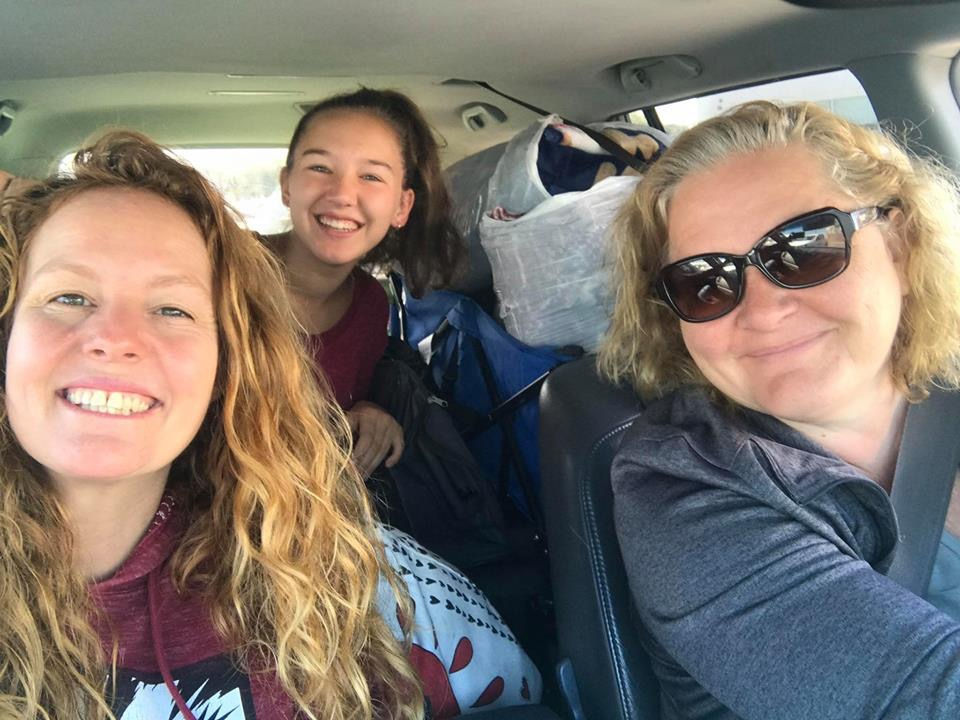
When we arrived at the stadium mid-afternoon, I was afraid we were in the wrong place or that the group had changed course. Unlike Irapuato, we saw nobody headed toward the pit stop. It turned out that we had just beat most of them there. Once we finally found our way to the right parking lot and found Wesley (the van), Rebecca, and Sam, we were able to pull in beside them and get set up just as larger groups started arriving. Mexican government organizations were serving beans, rice, and tortillas, and providing foam mats and blankets, which the members of the caravan set up just outside of the stadium. A tanker truck full of water was parked by the rows of Porta-Potties, where people could try to bathe albeit in full view of everyone and in freezing cold water.
Food on the left, mats on the right:
Bathing facilities:
One of the things that struck me was that except for the meal and mats provided by government organizations, the people who were distributing supplies were all people that I know. Rebecca and Sam were with Wesley, informing people about the process for legally asking for asylum and the dangers that would likely lie ahead, while handing out snacks and water and letting people charge their phones in Wesley’s charging station. Our SUV was mostly emptied within a couple of hours, as was Lindsey and Charity’s minivan. Shortly after that, Richard and Andrew showed up with a bounty of backpacks, underwear, t-shirts, shampoo, soap, and other needs. Sher, Gary, and Sandy showed up from the UU community with lots of food. After dark, Richard disappeared and came back with 250 hot tamales which were gladly received.
We didn’t have to deny any families a carrito this time!
The used-clothing distribution was a little less orderly than the rest:
There were several groups of people on-site from different organizations. Two men from a humanitarian organization helped keep the line in check while Aliya and I emptied Richard’s trunk. I spent some time chatting with 5 immigration officers, which is a story for another day, but when I asked why they were there they said that they would help anyone who wanted to go back to their home country, and they were also there to protect the volunteers. After that, I did notice their vigilance.
The guy in the red hat (Abraham) was a huge help keeping the line moving. He thanked us profusely for being there, and asked if he could hug me at the end (I almost never turn down hugs).
It’s hard to get beyond the logistics and the sometimes-inaccurate media reports and help people understand what it is really like to be there, but I hope the photos help. I can’t conclude without mentioning Aliya (my 17YO daughter). The kid was a rockstar, among all of the other rockstars who were there to help. With her Spanish ability and teenage energy, she worked tirelessly to match what we had with people who needed it. When a guy arrived late in the day with plastic slides (sandals) and no socks, she found a pair of fleece socks that she had hidden away earlier. He was thrilled. When a mom walked into the stadium in just her socks, there was a pair of sneakers for her. Babies and toddlers with no shoes, socks, pants, jackets…she hooked them up. A guy who REALLY needed a backpack got one. And at the end of the day, she sat and chatted with a group about politics, their plans, the US, music…you name it. Everyone was completely respectful and appreciative.
Aliya chatting with new pals:
The lady on the right walked in with no shoes:
This little boy was wearing only a shirt and a diaper:
The need for shoes is never-ending:
The guy in the poncho asked if I had a clean t-shirt but I told him all I had was a ladies’ shirt. He looked at me like, “Uh…I’m wearing a crocheted poncho.”
We drove the hour+ home emotionally and physically spent, but already making plans for how to prepare and what to buy for the next group that passes through. We don’t know when that will be, but they are coming. We wish they would not continue to the border, but most of them won’t be deterred by our warnings. They would rather die reaching for a better life, than die staying at home. They think that God will protect them. I cry when I think about what is ahead of them, but at least they will know that in Central Mexico there were people who cared about them and tried to ease their journey.
Rebecca doing her thing:
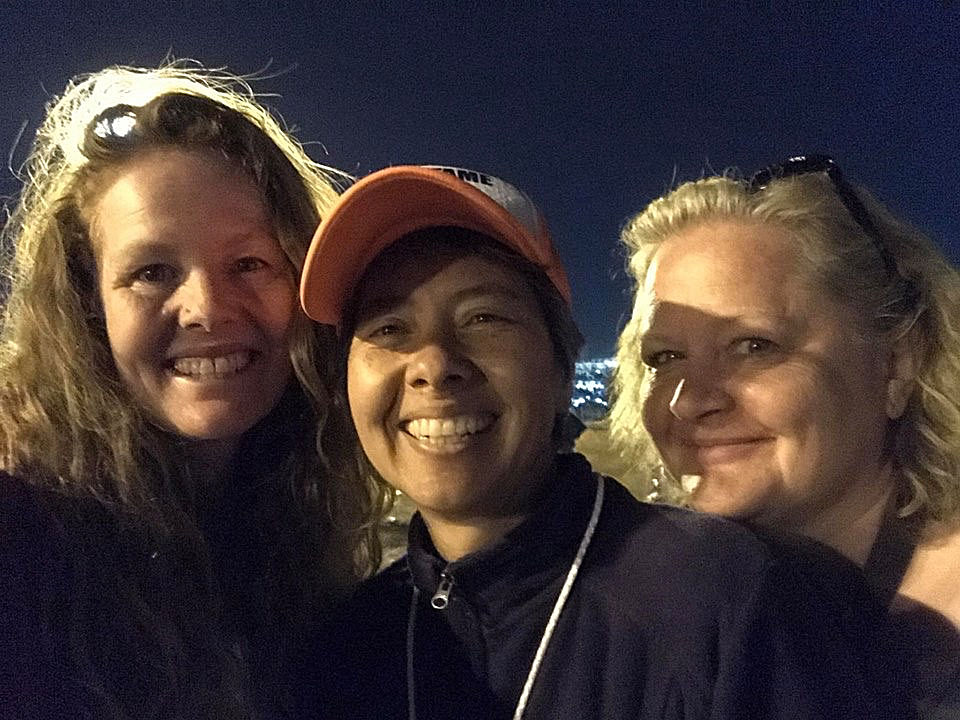

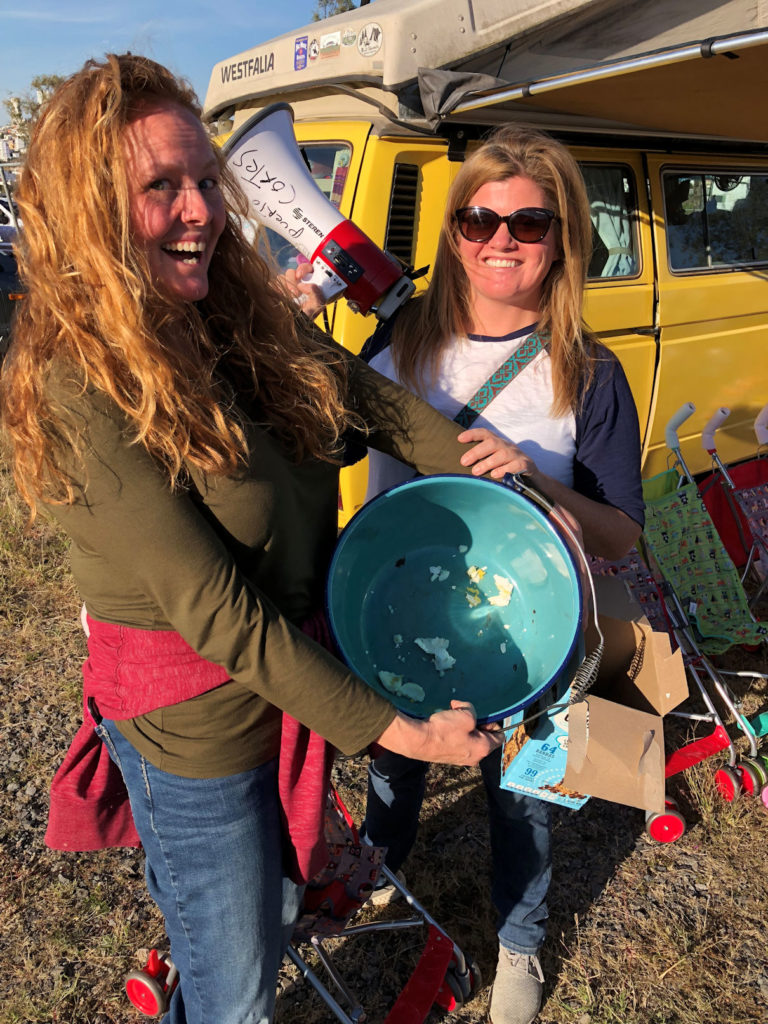

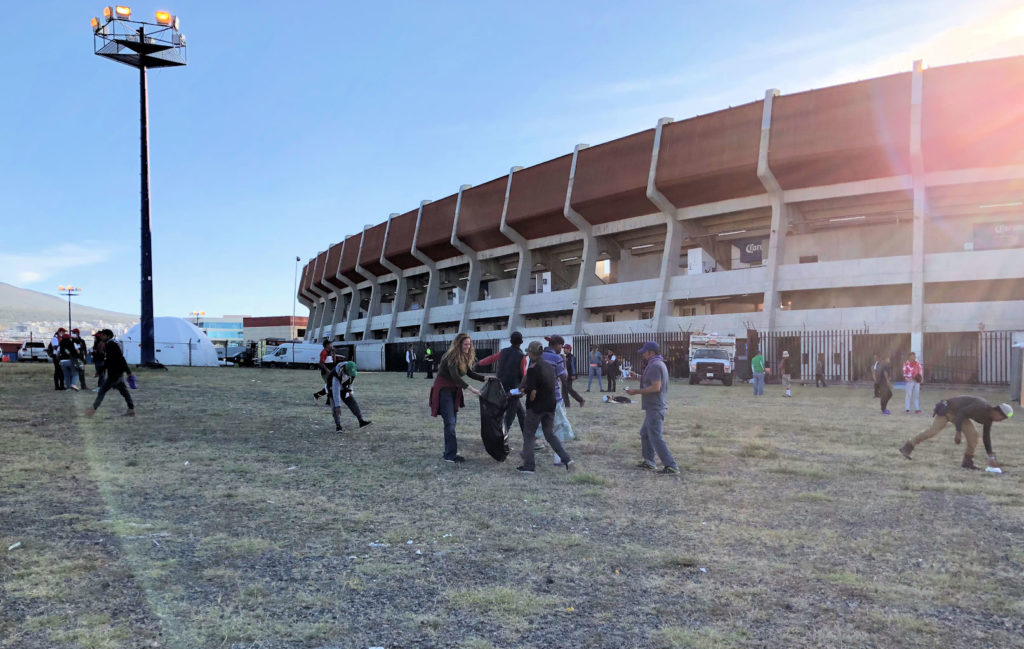
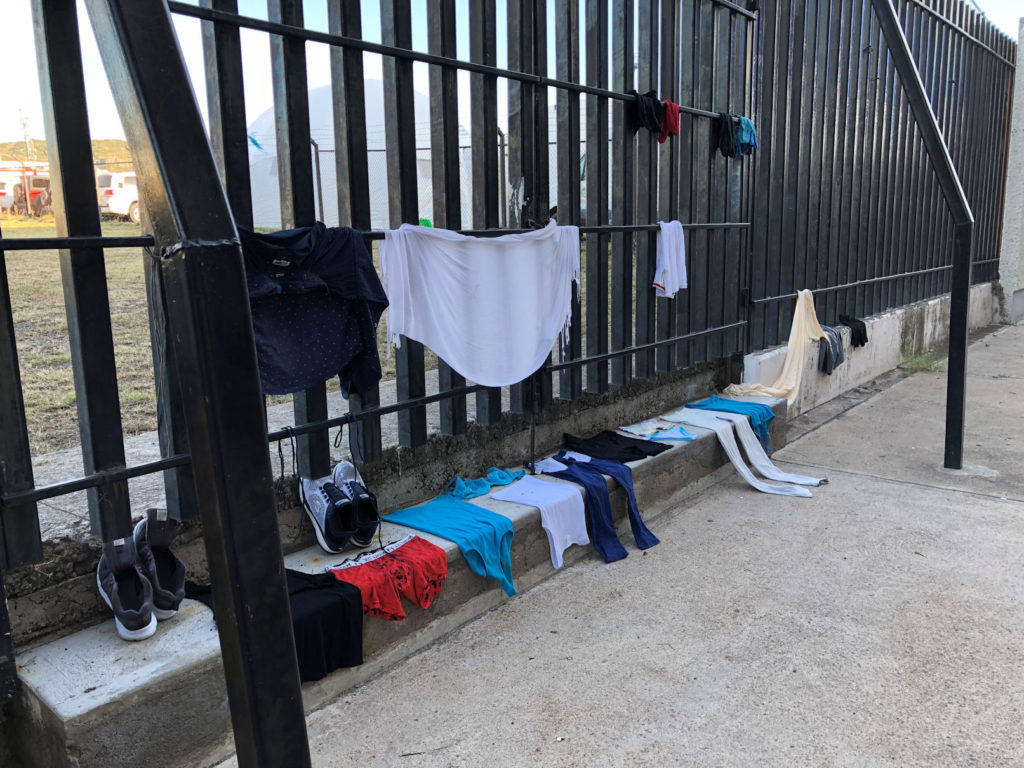
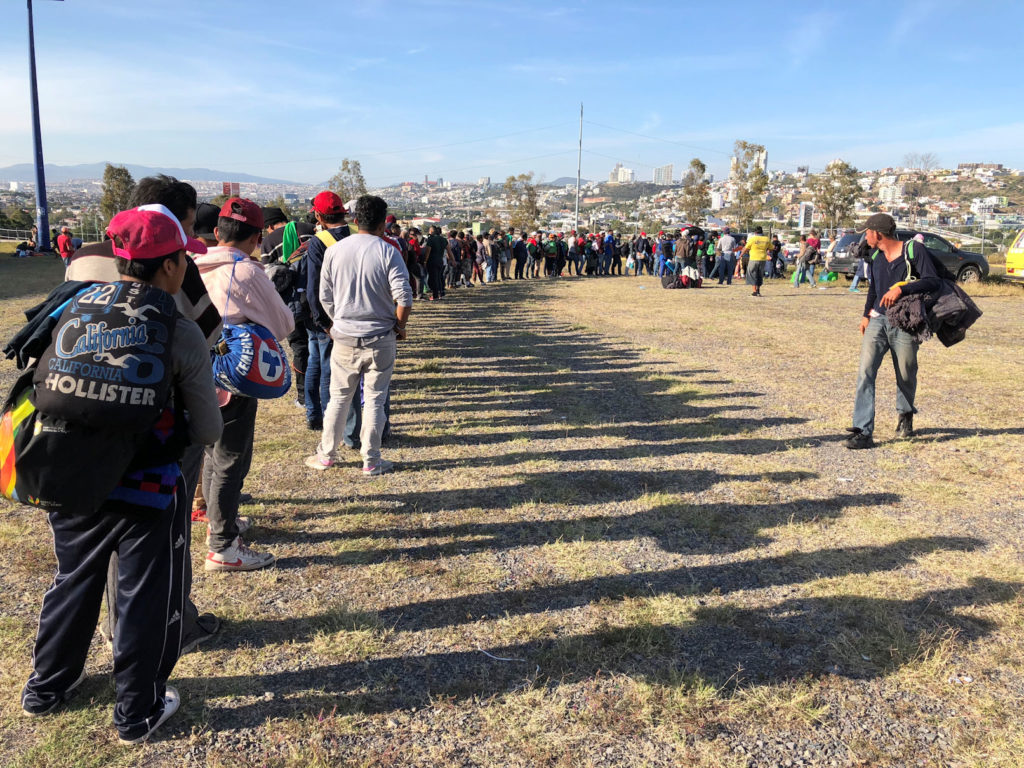
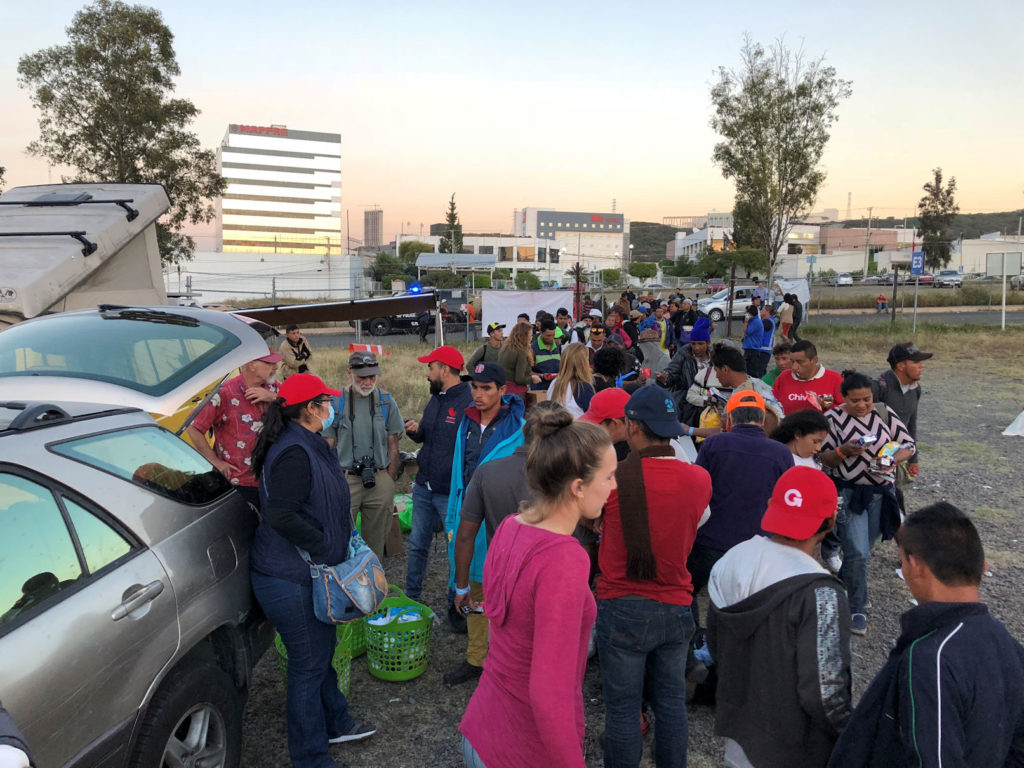
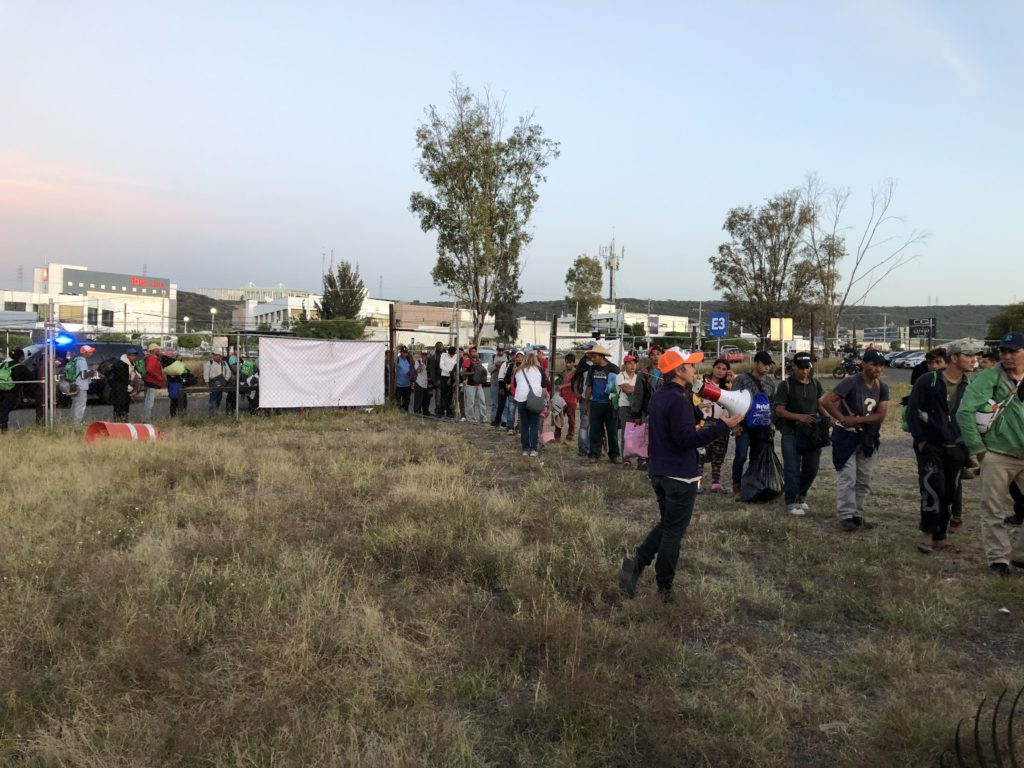
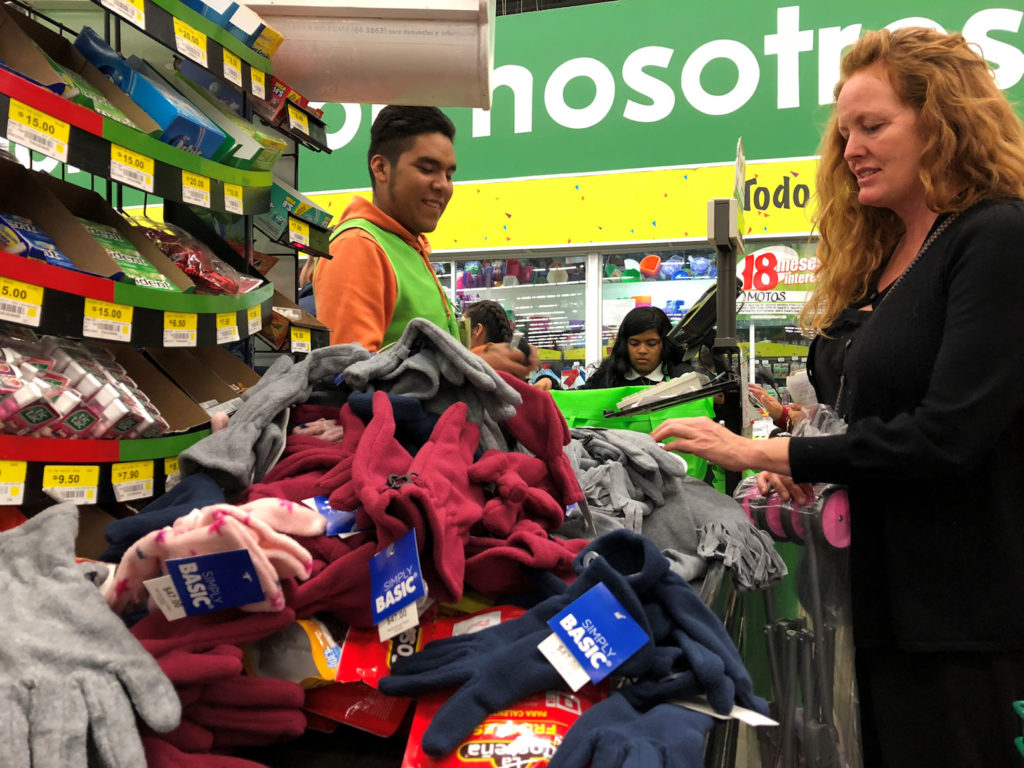
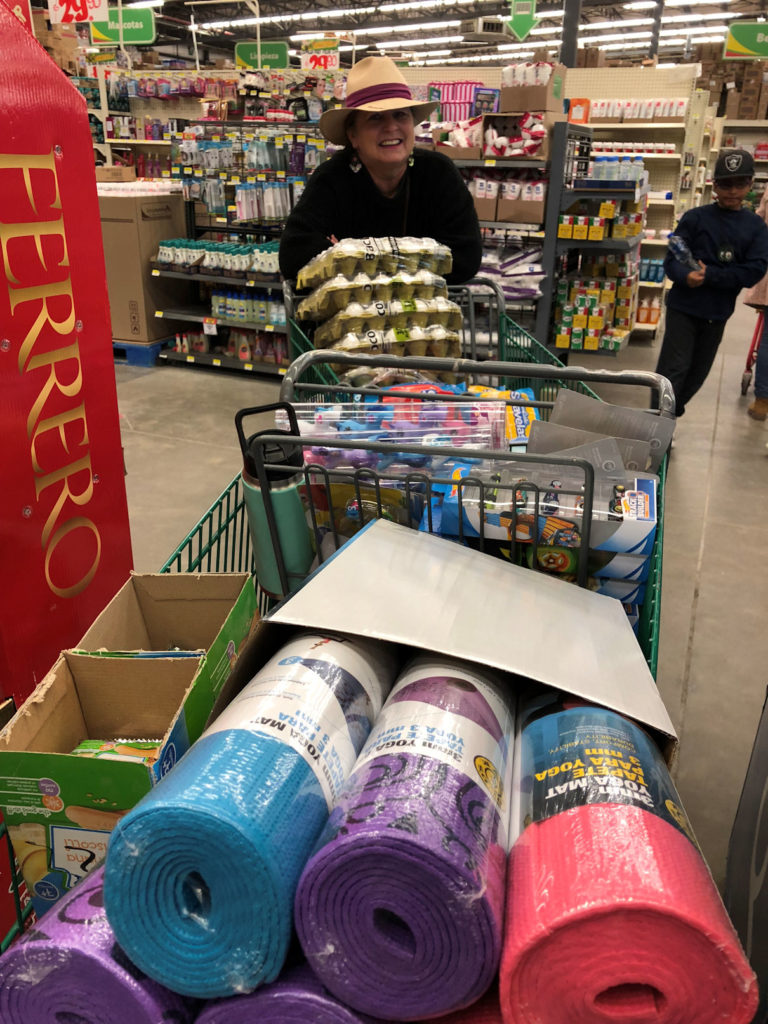
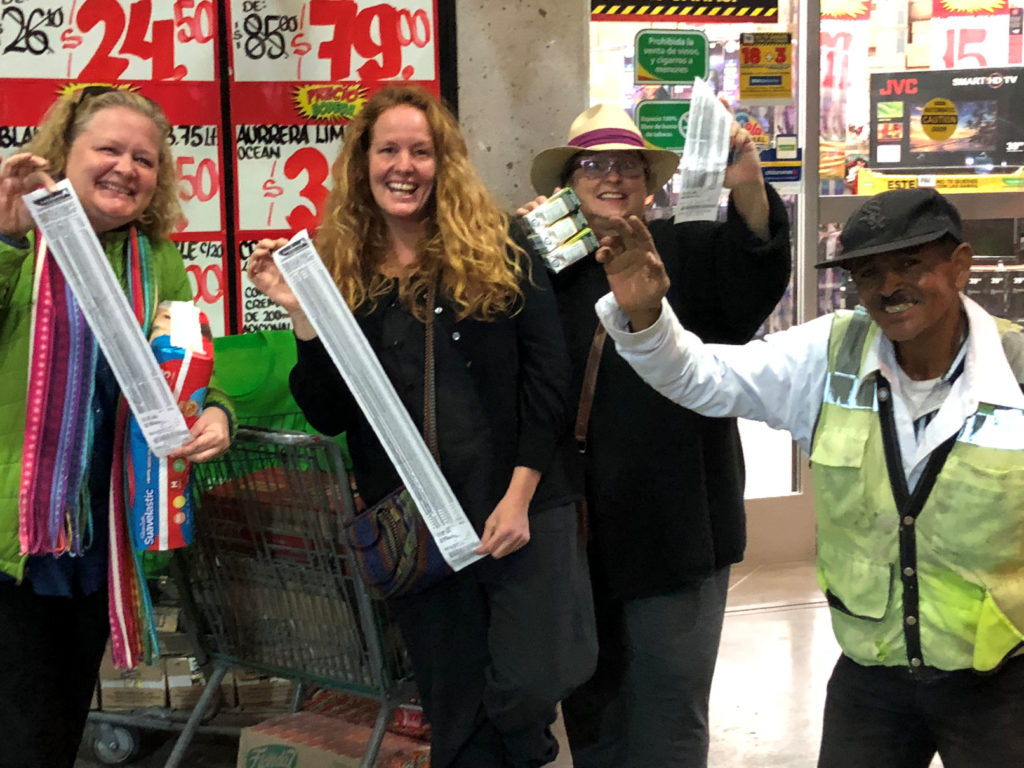
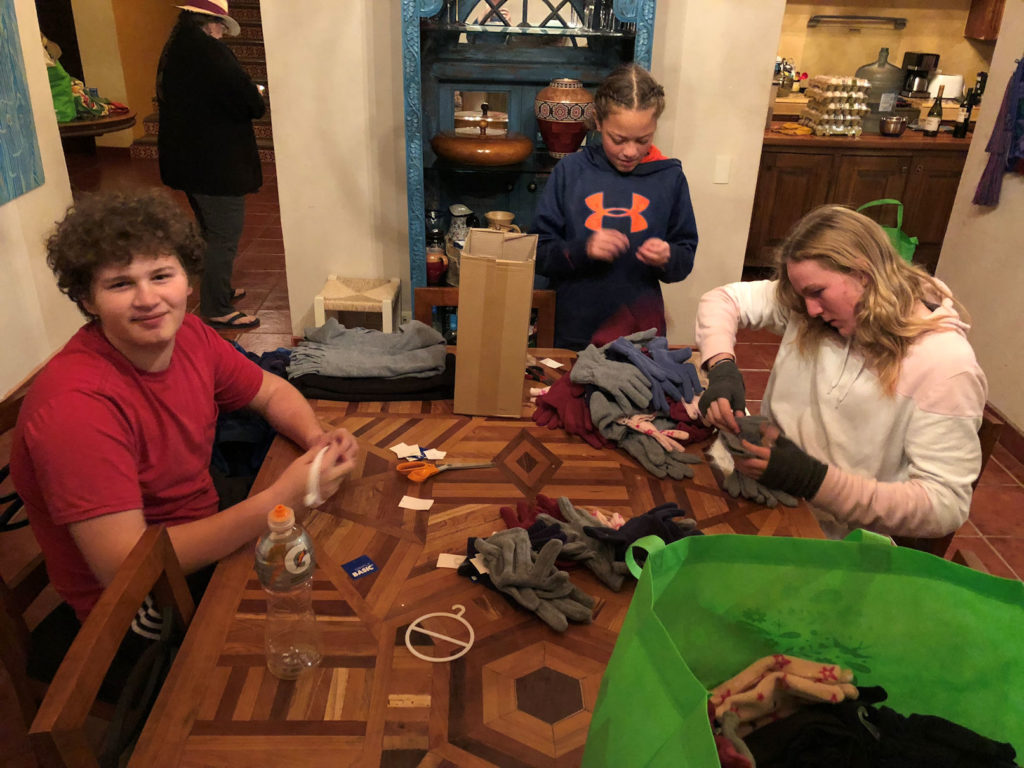
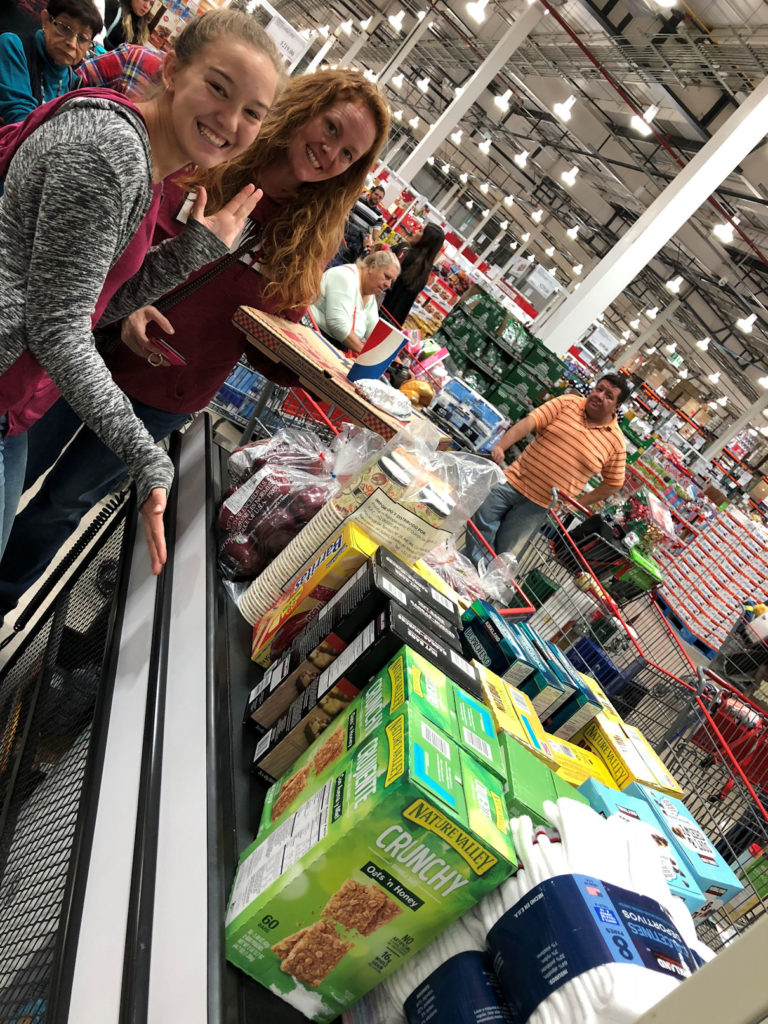
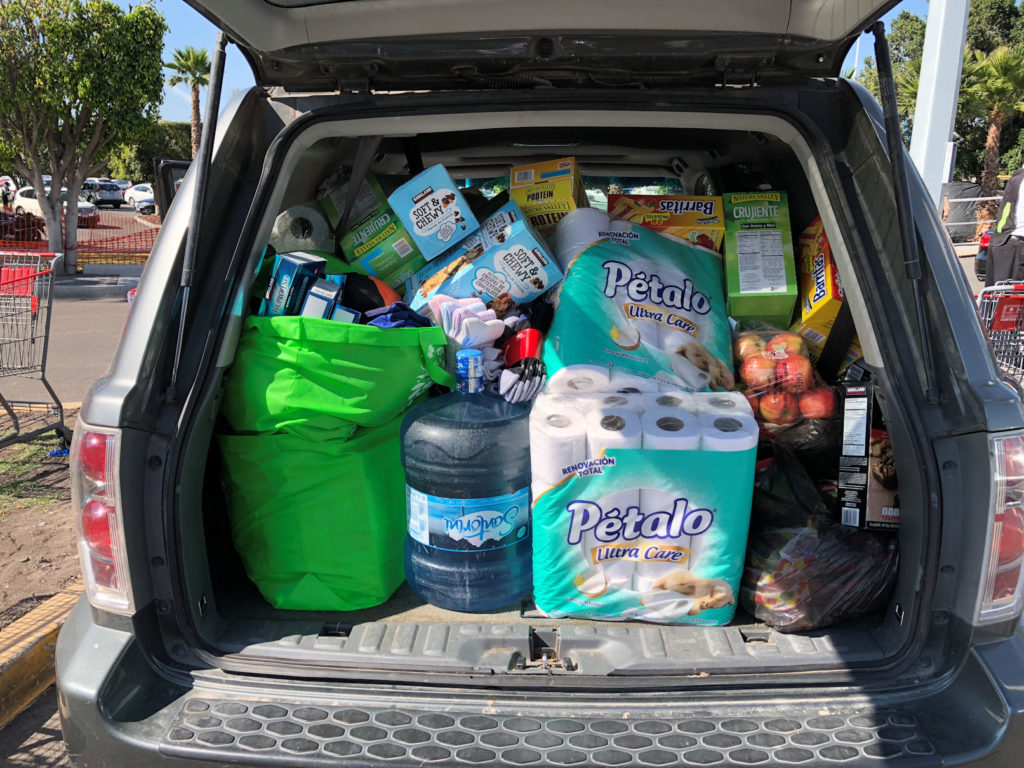
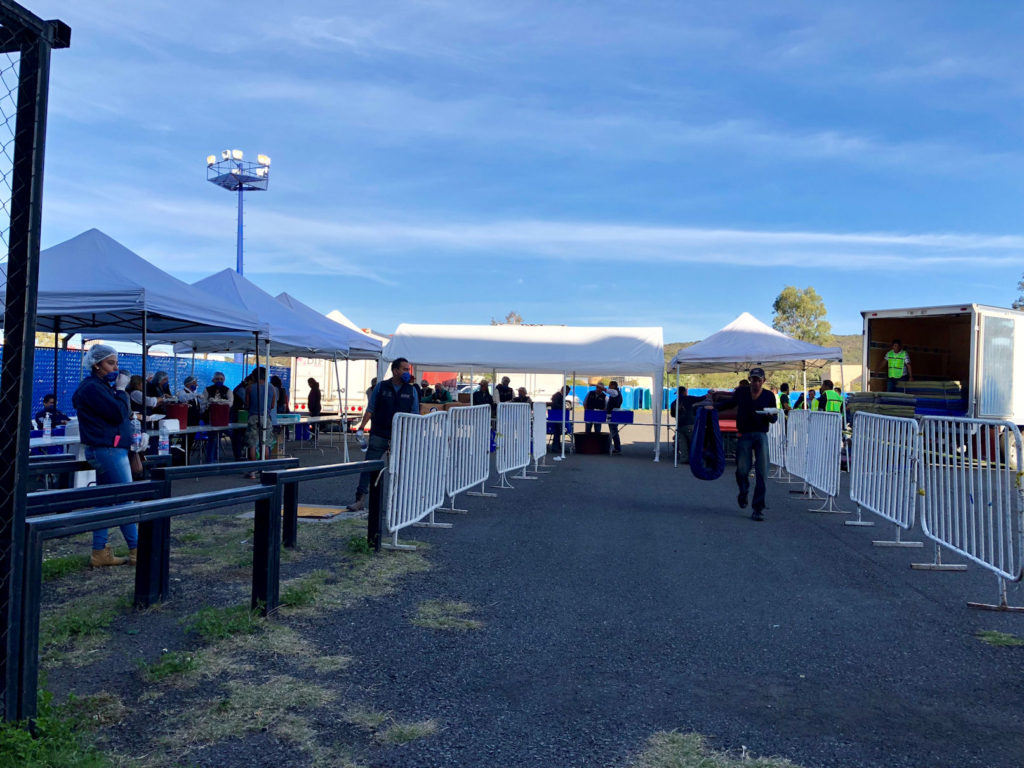
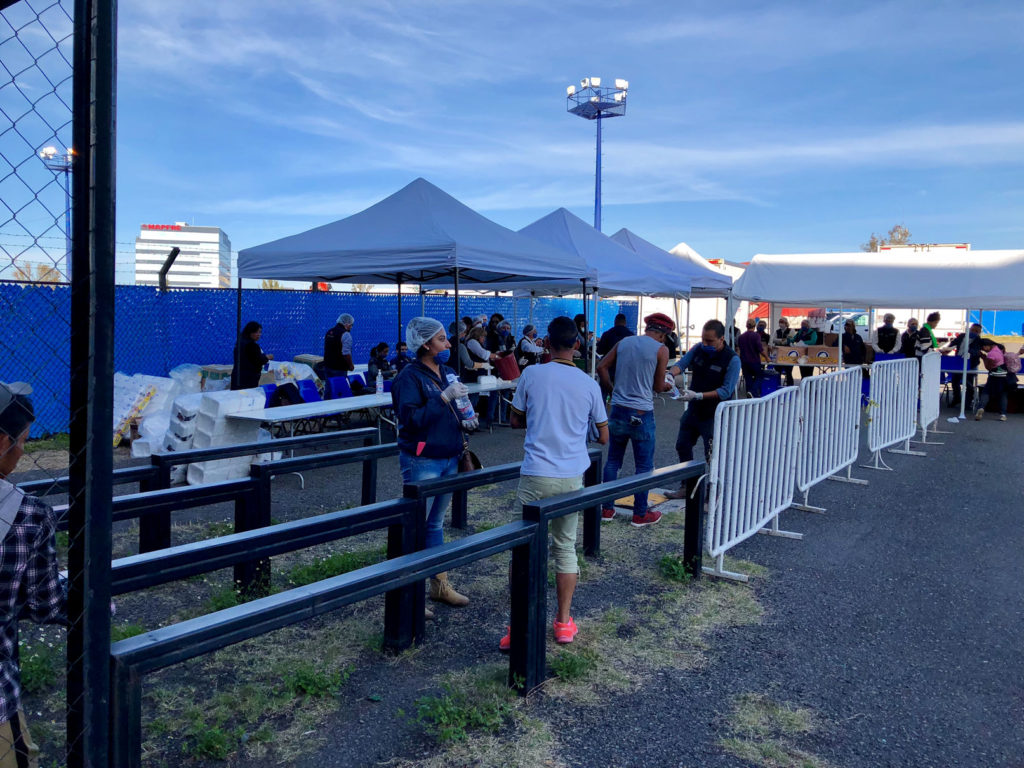
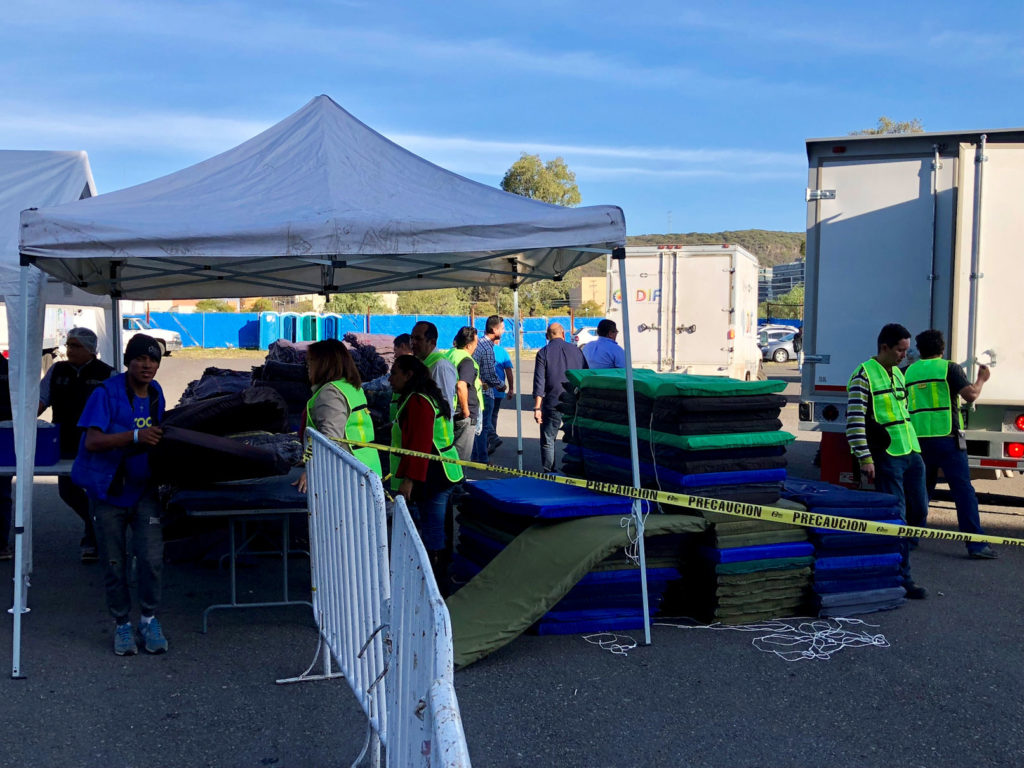
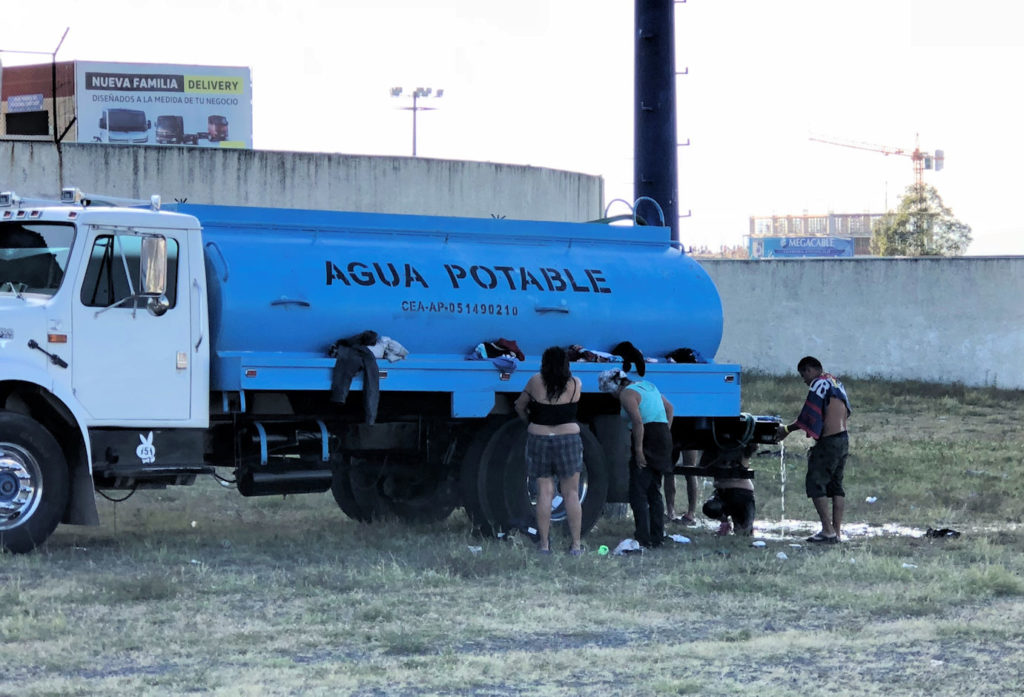
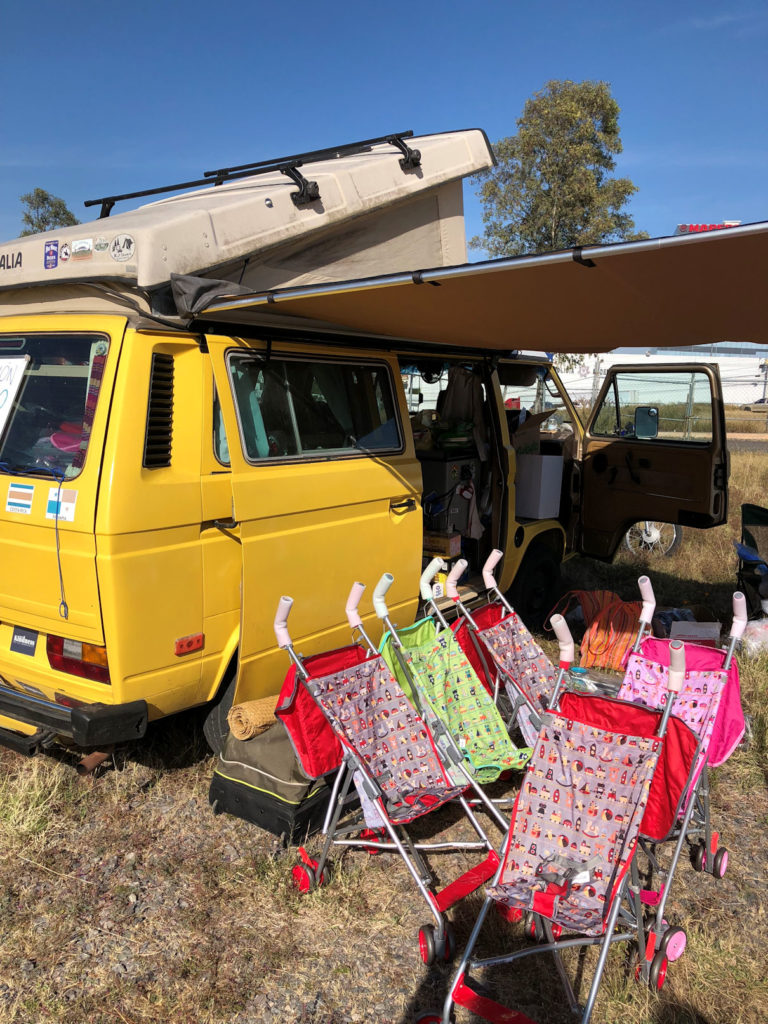
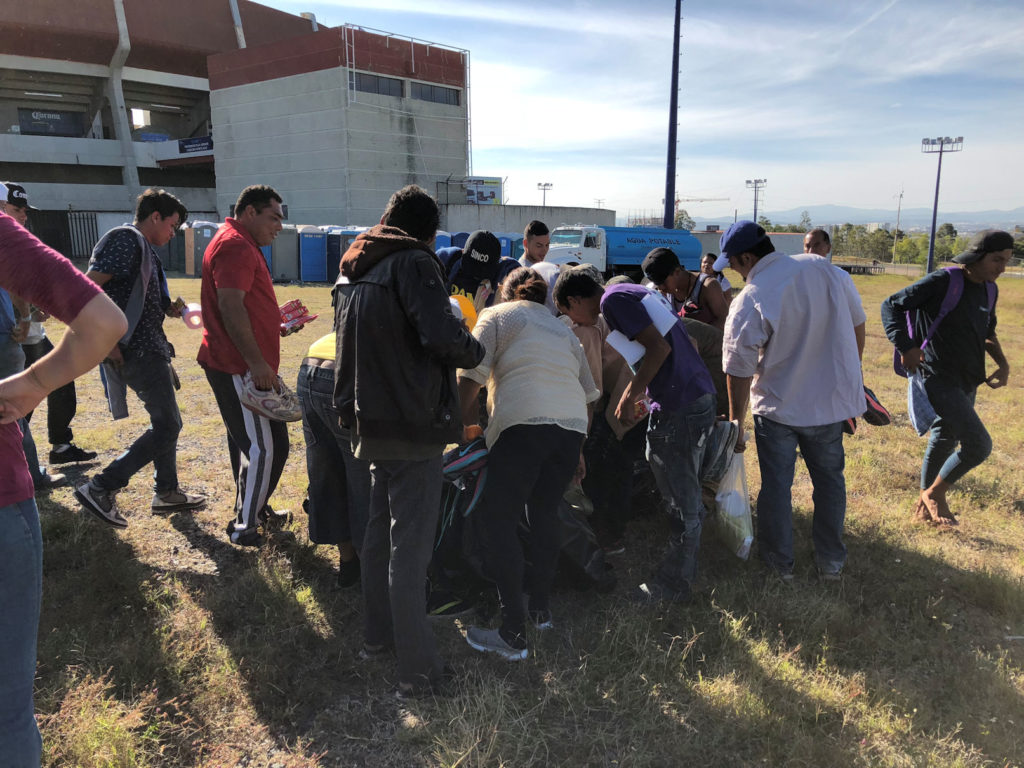
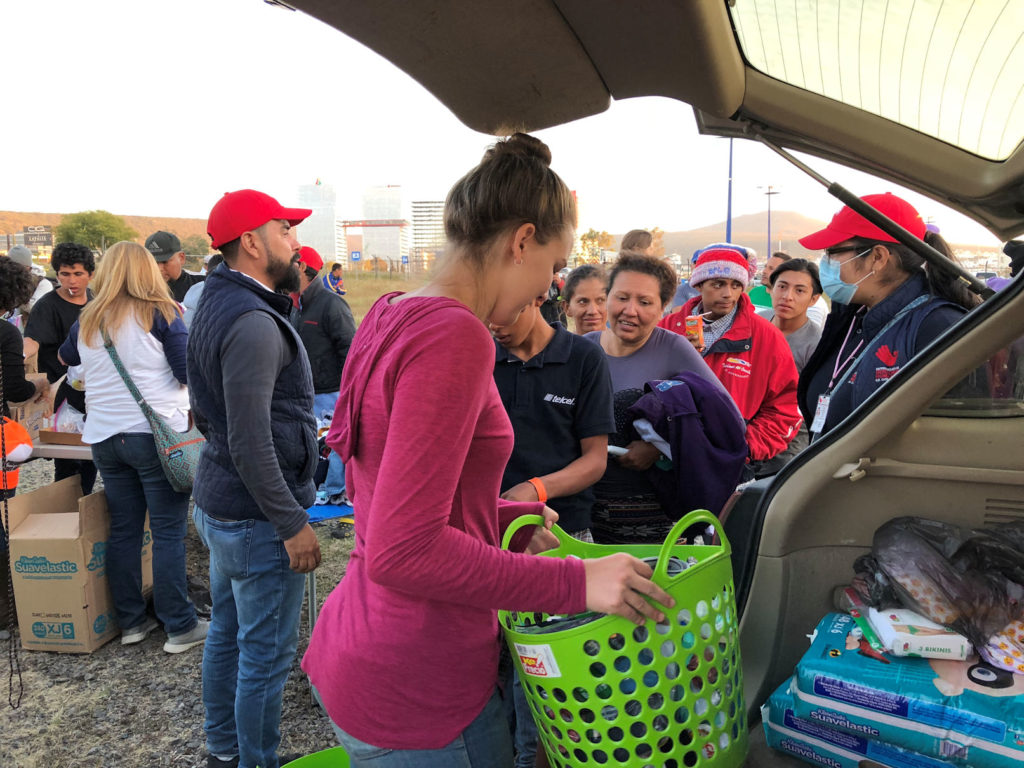
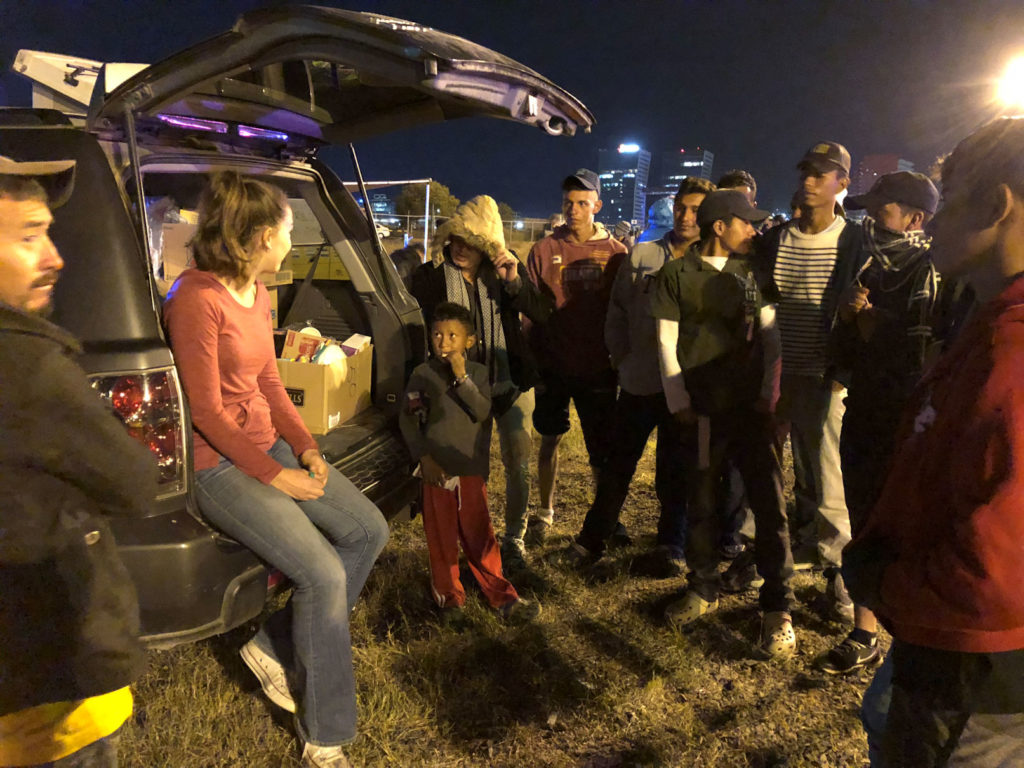
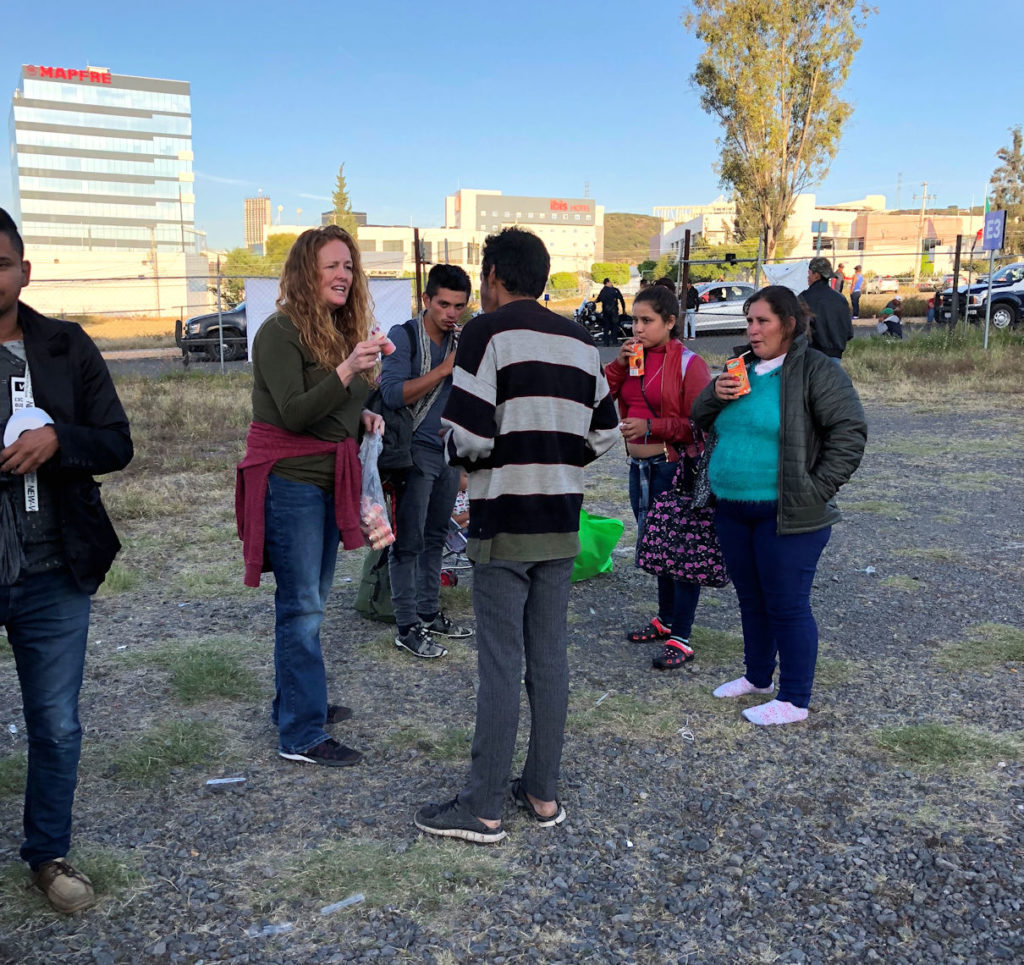
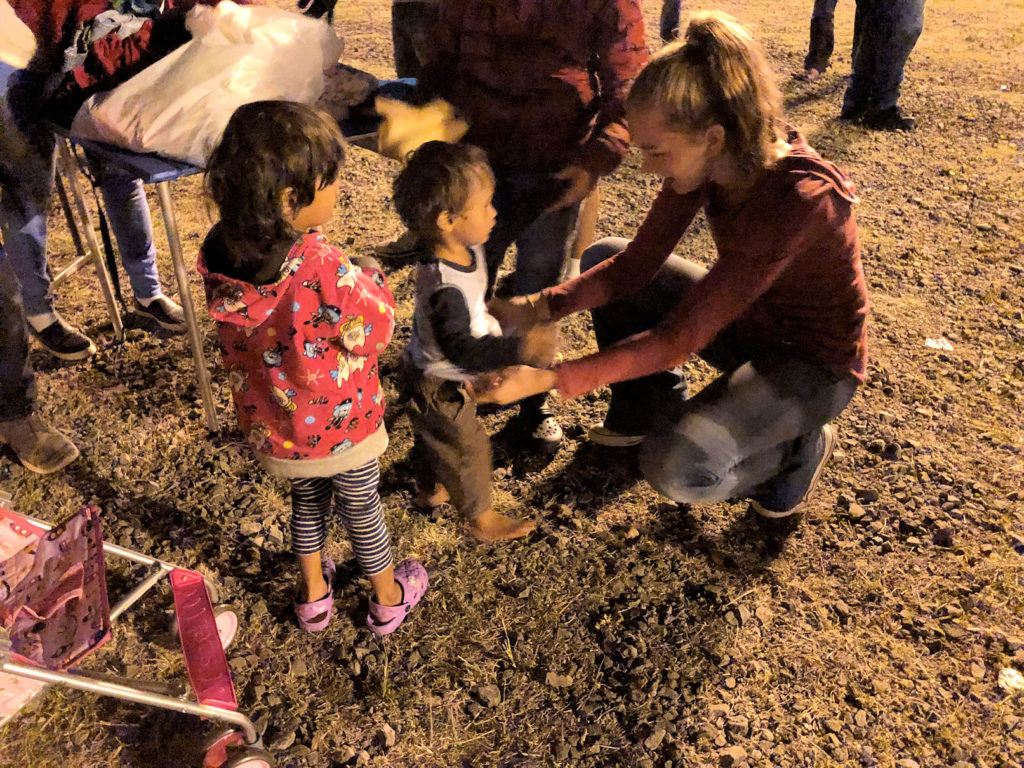
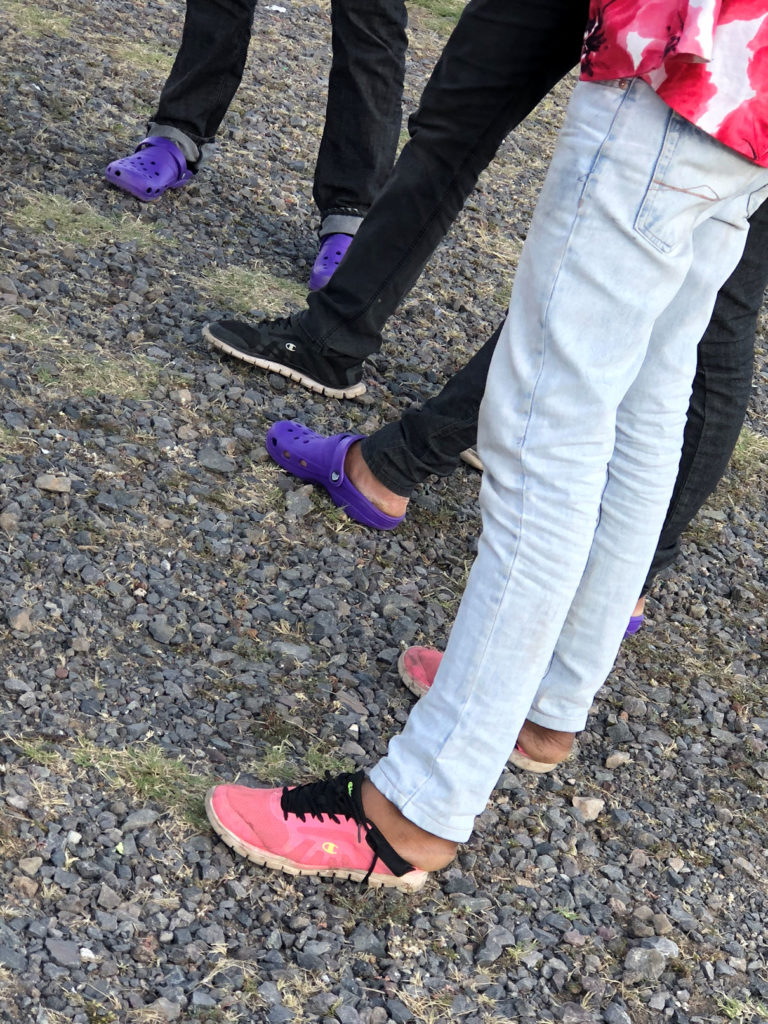
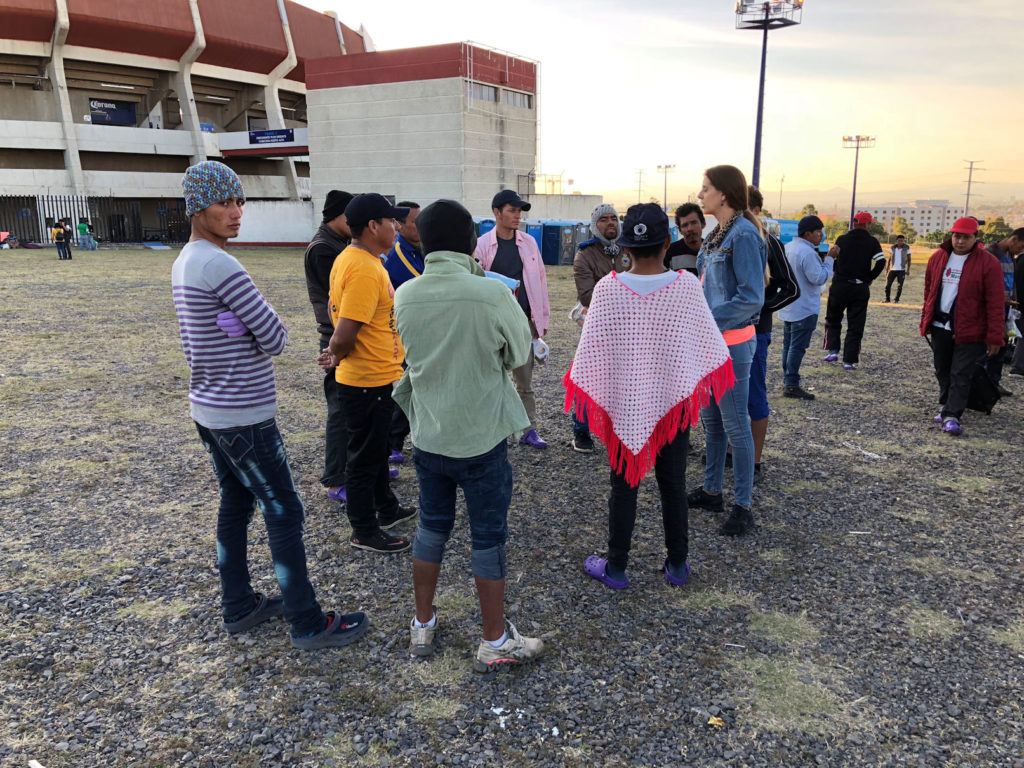
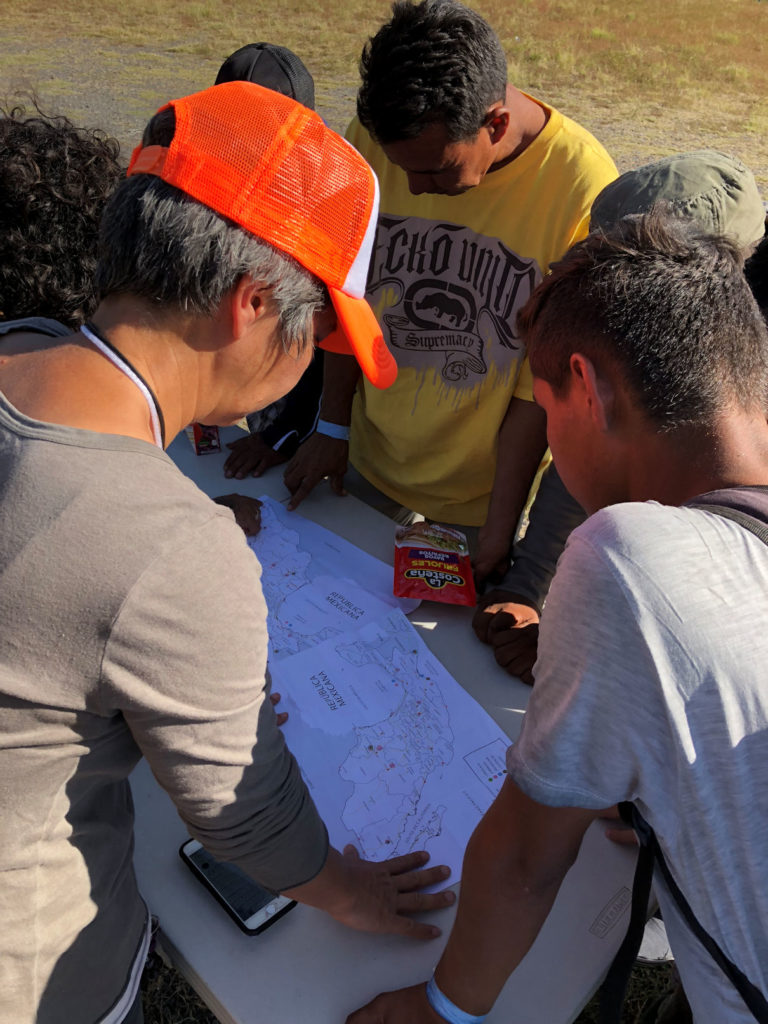
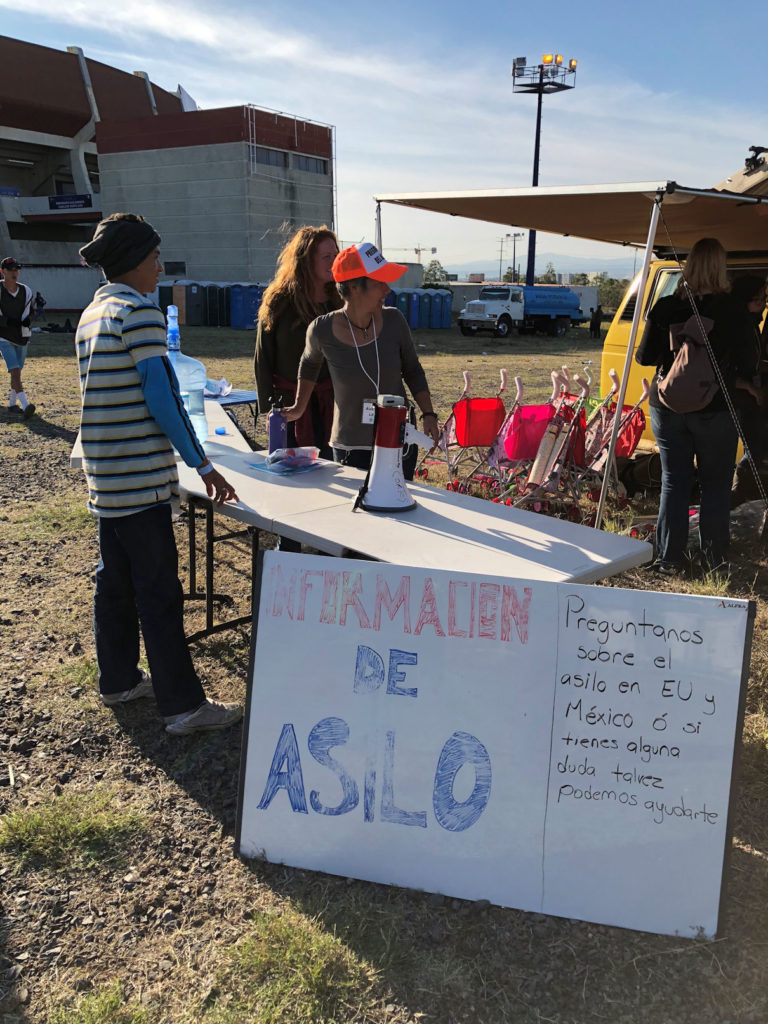
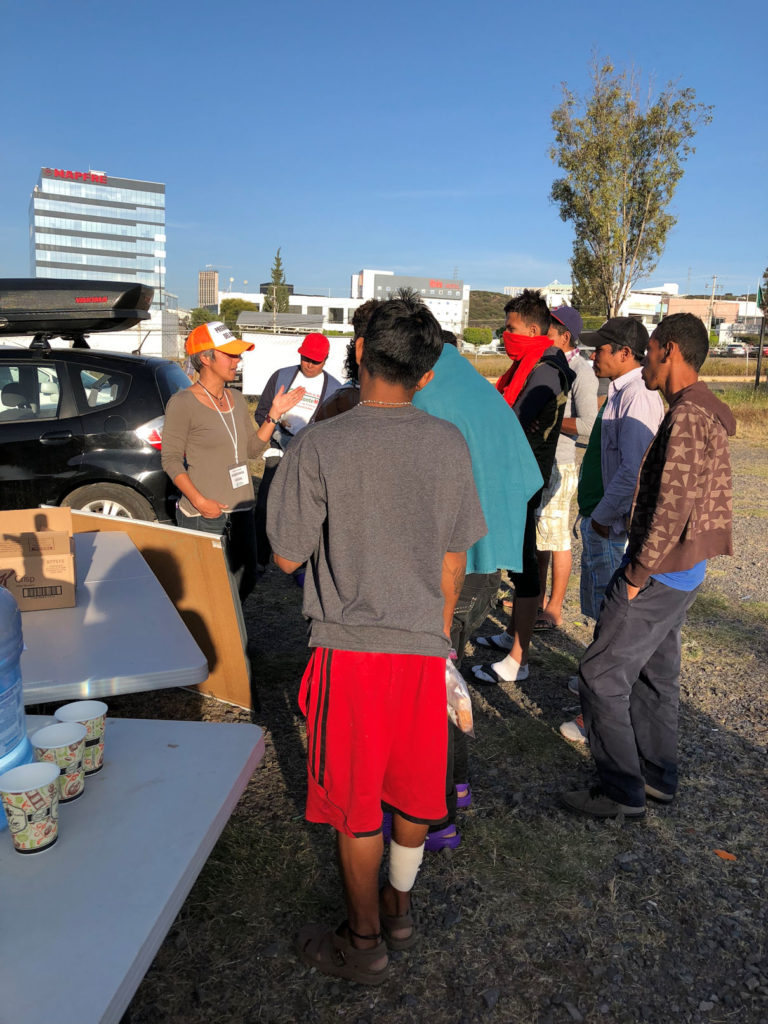
2 comments
Great post Lori! So important for the world to understand that these are peaceful, polite people, and many are children. So proud of my new San Miguel friends, who have been doing so much!
You are heroes! Thank you for all that you are doing!